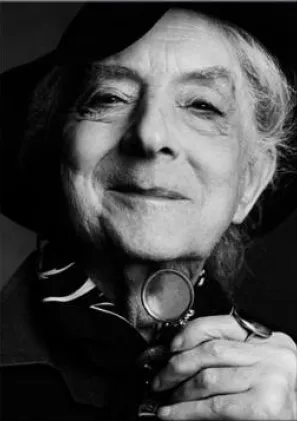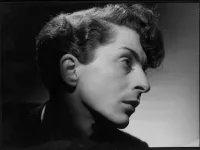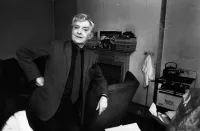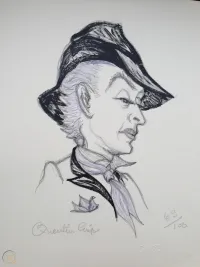Biography
1908 - 1999
“It is not the simple statement of facts that ushers in freedom; it is the constant repetition of them that has this liberating effect. Tolerance is the result not of enlightenment, but of boredom.”
– Quentin Crisp
Quentin Crisp was born Christmas Day in 1908 and lived without compromise from the start. In 1930s England he was “not merely a self-confessed homosexual, but a self evident one.” Unable to blend into society in any conceivable manner, he chose instead to be himself – a defiantly effeminate exhibitionist with his lilac hair, eye shadow, capes, scarves, blouses, painted fingernails and sandals to show off his painted toenails. Socially, Crisp carved his own place among the fringes of society - as a male prostitute, a nude model, a window dresser, and an assortment of random careers. When he attempted to join the army in WWII the medical board took one look at him and said he “suffered from sexual perversion.” Crisp first captured public attention in the 1960s with a radio interview and afterward was approached to write his autobiography. With the sensational publication of The Naked Civil Servant and subsequent film a unique celebrity was born. At 72 he moved to New York City at the invitation of Michael Bennett, creator of “A Chorus Line’. In the subsequent years Crisp wrote several books (including Resident Alien, How to Become a Virgin, and How to Go to the Movies); appeared in films (most notably ‘The Bride’ and as Queen Elizabeth I in ‘Orlando’); was a columnist/diarist for the ‘New York Native’; a stage actor (‘The Importance of Being Earnest’); a popular lecturer and anecdotal storyteller; and even appeared in a Sting video. A career all but opened around him to celebrate his outrageous and unique place in the world. Having lived an extraordinary life without equivocation, Quentin Crisp passed away on November 21, 1999 at the age of 90.
1908 - 1999
“It is not the simple statement of facts that ushers in freedom; it is the constant repetition of them that has this liberating effect. Tolerance is the result not of enlightenment, but of boredom.”
– Quentin Crisp
Quentin Crisp was born Christmas Day in 1908 and lived without compromise from the start. In 1930s England he was “not merely a self-confessed homosexual, but a self evident one.” Unable to blend into society in any conceivable manner, he chose instead to be himself – a defiantly effeminate exhibitionist with his lilac hair, eye shadow, capes, scarves, blouses, painted fingernails and sandals to show off his painted toenails. Socially, Crisp carved his own place among the fringes of society - as a male prostitute, a nude model, a window dresser, and an assortment of random careers. When he attempted to join the army in WWII the medical board took one look at him and said he “suffered from sexual perversion.” Crisp first captured public attention in the 1960s with a radio interview and afterward was approached to write his autobiography. With the sensational publication of The Naked Civil Servant and subsequent film a unique celebrity was born. At 72 he moved to New York City at the invitation of Michael Bennett, creator of “A Chorus Line’. In the subsequent years Crisp wrote several books (including Resident Alien, How to Become a Virgin, and How to Go to the Movies); appeared in films (most notably ‘The Bride’ and as Queen Elizabeth I in ‘Orlando’); was a columnist/diarist for the ‘New York Native’; a stage actor (‘The Importance of Being Earnest’); a popular lecturer and anecdotal storyteller; and even appeared in a Sting video. A career all but opened around him to celebrate his outrageous and unique place in the world. Having lived an extraordinary life without equivocation, Quentin Crisp passed away on November 21, 1999 at the age of 90.
Demography
Demography
Gender Male
Sexual Orientation Gay
Gender Identity Cisgender
Ethnicity Caucasian/White
Nations Affiliated United Kingdom United States
Era/Epoch Information Age (1970-present) Interwar Period (1918-1939) Post-Stonewall Era (1974-1980) Roaring Twenties (1920-1929)
Field(s) of Contribution
Author
Entertainer
Film
Journalism
Lecturer
Theater
Commemorations & Honors
Crowned Beaux Arts Society Beaux-Arts Ball King (1997)
San Francisco Rainbow Honor Walk Honoree (2022)
Demography
Gender Male
Sexual Orientation Gay
Gender Identity Cisgender
Ethnicity Caucasian/White
Nations Affiliated United Kingdom United States
Era/Epoch Information Age (1970-present) Interwar Period (1918-1939) Post-Stonewall Era (1974-1980) Roaring Twenties (1920-1929)
Field(s) of Contribution
Author
Entertainer
Film
Journalism
Lecturer
Theater
Commemorations & Honors
Crowned Beaux Arts Society Beaux-Arts Ball King (1997)
San Francisco Rainbow Honor Walk Honoree (2022)
Resources
Resources
Bailey, Paul, ed. The Stately Homo: A Celebration of the Life of Quentin Crisp. London: Bantam, 2000.
Crisp, Quentin. The Naked Civil Servant. New York: Penguin Classics, 1997.
Crisp, Quentin. The Wit and Wisdom of Quentin Crisp. Boston: Alyson Books, 2000.
https://www.theguardian.com/film/2009/dec/09/quentin-crisp-englishman-in-new-york
https://www.nytimes.com/1999/11/22/arts/quentin-crisp-writer-and-actor-on-gay-themes-dies-at-90.html
http://www.cnn.com/books/news/9911/21/crisp.obit/
https://www.pinknews.co.uk/2011/12/28/interview-phillip-ward-on-the-inimitable-quentin-crisp/
Resources
Bailey, Paul, ed. The Stately Homo: A Celebration of the Life of Quentin Crisp. London: Bantam, 2000.
Crisp, Quentin. The Naked Civil Servant. New York: Penguin Classics, 1997.
Crisp, Quentin. The Wit and Wisdom of Quentin Crisp. Boston: Alyson Books, 2000.
https://www.theguardian.com/film/2009/dec/09/quentin-crisp-englishman-in-new-york
https://www.nytimes.com/1999/11/22/arts/quentin-crisp-writer-and-actor-on-gay-themes-dies-at-90.html
http://www.cnn.com/books/news/9911/21/crisp.obit/
https://www.pinknews.co.uk/2011/12/28/interview-phillip-ward-on-the-inimitable-quentin-crisp/






